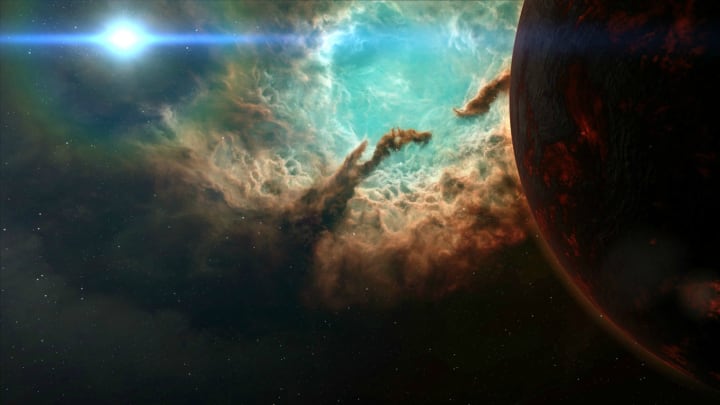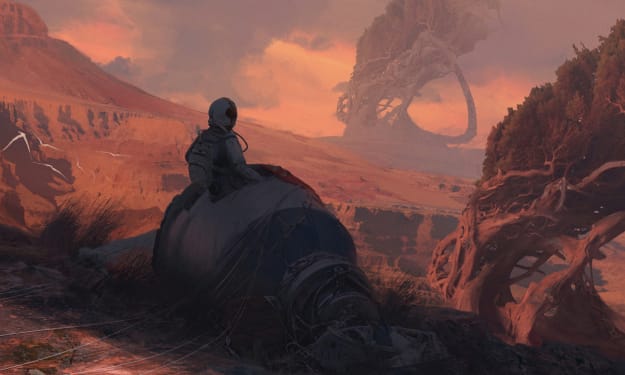299,000 Kilometers a Second
The future of space missions will require speeds beyond our current comprehension. Kilometers will be measured in seconds.

Bill had 24 hours before his flight. He had spent the last month jettisoning his possessions to his friends and family in a process that felt a lot like a living funeral. All his books, most of his clothes, and many of the objects he had collected for years began to feel heavy on him.
Bill would look at the shelves in his apartment and think about someone finding them. Someone coming into his living space, maybe they were breaking in, and looking around at what he had amassed over 36 years of living. There were books he hadn’t touched in years, shirts that he had been given at charity events, collectible mugs, and boxes from electronics that he had just never bothered to throw away. Now that he was leaving, now that he really had to face all these objects, they became meaningless. Nothing more than tokens of memories that were all still present in his own mind, Bill knew he wouldn’t miss any of it when the time came to part with everything that surrounded him.
He held a yard sale. Right out in front of his apartment building, on the chemically treated grass, he laid his life bare for those who might have a passing interest in purchasing a piece of it. He lined some of the delicate items on a plastic folding table he borrowed from his neighbor. Trinkets, pins, hats, and magazines made up the majority of the items for sale, most of the clothes he had sorted through he had donated to a local charity.
When his mother had died three years ago, Bill and his sister Lorraine were left to empty the house their mother had lived in for the last 15 years. Lorraine was nine years younger than Bill and had lived in the house for a much longer period of time. She found she still had a strong emotional attachment to many of the items she came across. Bill had been in college those years, living far away, then starting a family of his own, and had no problems discarding the dozens of magnets his mother had placed on the refrigerator. They meant nothing to him; he was simply picking up a piece of plastic and tossing it into a bag.
It took them three days to empty the house and get it ready to be sold. He hadn’t spent much time with his sister in years and at the end of each night they ate dinner in the same restaurant, trading stories of the last decade of their lives.
He took one thing from the house. His mother had saved a pin from his first mission in space. A company had manufactured a limited number and sold them at an inflated price to commemorate the mission. Bill looked at the pin for much longer than he intended, and then he placed it in his pocket before his sister could see the pangs of nostalgia on his face.
The house was sold at a small loss to a young couple looking for a starter home. Bill had no reason to ever go back to that neighborhood.
For a brief time when he turned 30, about a year after his divorce was finalized, he regretted not having a child. He and his wife had tried for a little over a year, the same year that their relationship was becoming more distant and strained. Failing to conceive was what finally gave him and his wife permission to call their marriage a failure. They stopped talking after all the paperwork had been signed. He hadn’t seen her for the last four years.
Bill was an astronaut. And he was about to go on the longest mission anyone had ever attempted.

via Eve Online
X
“Why are you doing this, Bill?”
He took a long moment before he responded. “I have the chance to see something that no one has ever seen. I…It’s an extraordinary opportunity.”
She didn’t look like she had aged. It had been four years but to Bill she still looked the same. Good for her, he thought.
“I could stay here, I could live however many years, and then die…or I could do this.”
“But when you come back, if you ever really do come back…it’ll be almost 100 years later…and…”
“And I’ll only have aged eight years.” He was nodding. “I’ll be the world’s first time-traveler.” She looked at him like he was sick. He was serious, and she knew it; he really did think of himself in this extraordinary way now. He seemed fully detached from the reality of the world around him and in love with this idea of a strange immortality.
“I’ll get to see moments I never would’ve dreamed of seeing.”
“What if you come back and civilization is destroyed?”
“What if I come back to a utopia?”
“And you think they’ll remember you?”
Bill hadn’t thought of that. In his mind, the world would be waiting with bated breath for his arrival. People would pass the story down a generation, informing them of the exact time of his expected arrival back on Earth. What if he arrived to little fanfare? Would that make his journey to the stars any less extraordinary? Bill didn’t know the answer and at this moment in time it was too late to go back and change his mind. The mission was moving forward regardless of his feelings.
“That’s a chance I’m taking.”
“You didn’t think of anyone else? Your sister?”
“I talked to her about this.”
“Just not me.” She said, raising her glass and keeping her eyes down.
“It was difficult for me to talk with you again.”
“Why?”
Bill shook his head from side to side. He looked at his ex-wife in a true moment of zen. He didn’t feel all of the emotions he once did. He knew this would be the last time he would ever see her, and he knew that this was his last moment to ever look at her. She had contacted him when the news was made public, when it became known exactly who was going to be going on this voyage. He didn’t expect it, but he knew he couldn’t turn her down.
“Bill?”
“Sorry?”
“Where are you?”
He didn’t blink for the next seven seconds.

Congress
Fifteen years ago, Congress passed a budget that allowed this project to move forward. With space exploration beginning to plateau again, this was looked at as a new moon shot, something that might truly engage the public and their understanding of what was possible. Send a man to the nearest star…at the speed of light. Or as close to the speed of light as could be achieved. Now, this was not the most instantaneous payoff. It didn’t have the timeline that a mission to Mars or Jupiter’s moon Io had. This was a multi-year mission for him, but a decades-long venture for the organization.
Acceleration began slowly—it had to, otherwise he would be crushed by the force behind him. Bill thought about how when he was a child he would watch on the monitor of the airplane as it said the flight’s ground speed was almost 1,000 kilometers per hour. It certainly didn’t feel that fast. As he accelerated now, he thought the same thing. The engineers had fixed acceleration in a way that made it seamless to his human form.
The ship was cold and now he felt alone. He didn’t think it would come this fast, but it had. There was an artificial intelligence on board to converse with him but he just didn’t feel up for that right now. He wanted to be alone, he wanted to feel the real solace of this moment. Everything and everyone he had ever had contact with was over a million kilometers away now. His heart skipped a beat in a moment of panic before he fully relaxed, realizing this was really what he always wanted.
Bill had a hard time communicating what he wanted in his relationships and he was aware of that. This was one of the reasons this was an appealing proposition to him. He knew his issues weren’t uncommon, but he couldn’t see the harm in volunteering.
The selection process had taken more than 18 months and there were two false starts with other candidates. Trevor Hickham had been selected and then pulled out of the program six weeks into the training. Bill could never figure out why he really left, he just heard the standard boilerplate answer that “he was no longer interested in the program.”
Replacing Trevor, Kyle Bean was almost 10 years younger than Bill. He had graduated incredibly early and had been with the agency for only two years when his training began. During a late night out, Kyle had been in a car accident that broke his left leg. To keep on schedule, he had no choice but to drop out of the program.
There had been no backup training when Trevor dropped out. Once Kyle was selected, backups trained concurrently and this was how Bill filled the vacant slot so quickly and without causing any further delay.
Bill met Kyle in the hospital and they talked for a long while about what this mission meant to them. Bill remembered telling Kyle that he was afraid of the media’s eventual reaction to finding out who the new candidate was. Press coverage hadn’t been a problem with this mission as it always seemed to be a far-off finish line for them. By the time the launch date came near, Bill had become acclimated to press interviews and cameras around him for at least a part of the day.
Bill walked into the portal where the plants were stored. The grow lights were white with just the faintest tint of blue; the green of the plants calmed him and made him feel just a little less alone.
He had passed Jupiter and Saturn, one of only a handful of people to ever get so close to those gas giants. They were astoundingly large, overwhelmingly so. He couldn’t help but be taken in by their grandeur. He noticed that he was holding his breath as he stared at their almost crushing beauty. Bill wanted those moments to last for the rest of his life. He was beginning to move with such speed that he thought he might’ve started to feel what was meant to be an imperceptible shift, and in reality he probably didn’t feel any change at all except that these planets were smaller and smaller, faster and faster, and he wouldn’t see them again for many years.
A part of the mission, a rather large part of the reason to send a human being, was to see the effects this long-term travel would have on someone with no enhancements. Bill was still young and hadn’t needed any of his biological organs enhanced or replaced. More than 30 percent of the United States now had some range of enhancement. The number was closer to 10 percent worldwide. Bill wondered what that number might be when he came back. Would he come back to a society that had fully merged with machine? Would he be so anachronistic when he returned that he would be confined to a zoo for his remaining years on Earth?
The days had their monotony, but Bill was able to read or watch almost anything that had existed up until the day he left. He caught up on every Best Picture winner that he never had the time to see, read many of the classics he had rushed through in high school and in his two semesters as a literature major at university. His favorite book was The Sun Also Rises by Ernest Hemingway, and his favorite movie was Out of Africa.

via NASA
The First Year
It was almost the end of the first year now. He had grown a beard for the last six months and today was the day he was going to shave it off. It was a way to mark time, a project that required almost no effort from Bill, save for having to endure the itchy period around the three week mark. The buzz of the shaver and the suction of the vacuum attachment was all he could hear as the inches of growth on his face disappeared.
He had escaped the gravity of Sol and was now interstellar, yet he wouldn’t reach Alpha Centauri for another three years. As the schedule had been laid out, he was to arrive at Alpha Centauri, stay for a period of 14 days, and then return to Earth. He would collect images with the on-board camera and much more with the rest of the sensors. Drones would be deployed that would gather even more data.
There were a few times every month when Bill would become nostalgic for something. A moment, a memory, something he once had in his possession, or a person who had once crossed paths with him. He even missed his ex-wife on occasion. He’d think of a glance she gave him, the way a kiss felt, or just how the color grey made her eyes pop.
“This chili is really lovely,” said the best-actress winner of 2026.
“This is actually my grandmother’s recipe,” said an unidentified friend of the actress.
Bill could almost smell the chili. He liked listening to a depository of voices, mostly celebrities, that had been archived for posterity. They spoke about a large array of topics—none were actual formal interviews—and for a moment here and there Bill was able to forget he wasn’t able to respond to these voices. Some of the voices were quite old and had been recorded on inferior equipment, while others made you feel like that celebrity was whispering a secret right in your ear. The original engineer behind this particular project would occasionally ask the celebrity to simply have dinner with a friend and leave the recording device on the table, capturing them in their “natural habitat,” as he liked to say. The project began as an avant-garde exhibition in a fringe art museum in Los Angeles, but Bill had seen a news story about it and asked if it was possible to bring a sample along. When the artist heard about it, she made sure Bill had every recording.
It had been thought by some that his journey would come to an early end just by the sheer speed coupled with the increasing chance for interstellar material to collide with the vessel. That wasn’t the case yet but Bill knew that it was a possibility and the ship had proximity detectors that would alert him to any incoming objects or craft.
Every moment that passed felt like an ending. Each moment gone, never to return, and as real as any dream Bill ever had.
There were so many things that could go wrong at any moment, so many moments that could end the mission and Bill’s life. But that was the same on Earth. Each passing moment could lead to a possible end.
“We should do this again.” Bill was listening to a lunch between a famous young actress and an unidentified lunch date.
“Yes. Wednesday?”
“I’m going to be in Bali the next six months. We’re filming on location.”
“Six months! So long. Well, when you get back then.”
“That sounds great.”
Bill didn’t think the years would pass any quicker than the first one, but there was now an expectation for what each year might be like. He typed a list of goals that included learning Mandarin and keeping a dream journal.
He pulled the pin out of his pocket, the one his mother had held onto for so many years, and gazed at it longingly once again. Bill thought about what he might look like to an observer out in space: A small dot coasting forward, moving faster than anything man had ever made, barely making a dent in the vastness of the cosmos.
About the Creator
Brett Ryan Bonowicz
Filmmaker and author. Wrote and directed The Perfect 46 and is currently in production on Closer Than We Think, a documentary about futurist Arthur Radebaugh.






Comments
There are no comments for this story
Be the first to respond and start the conversation.